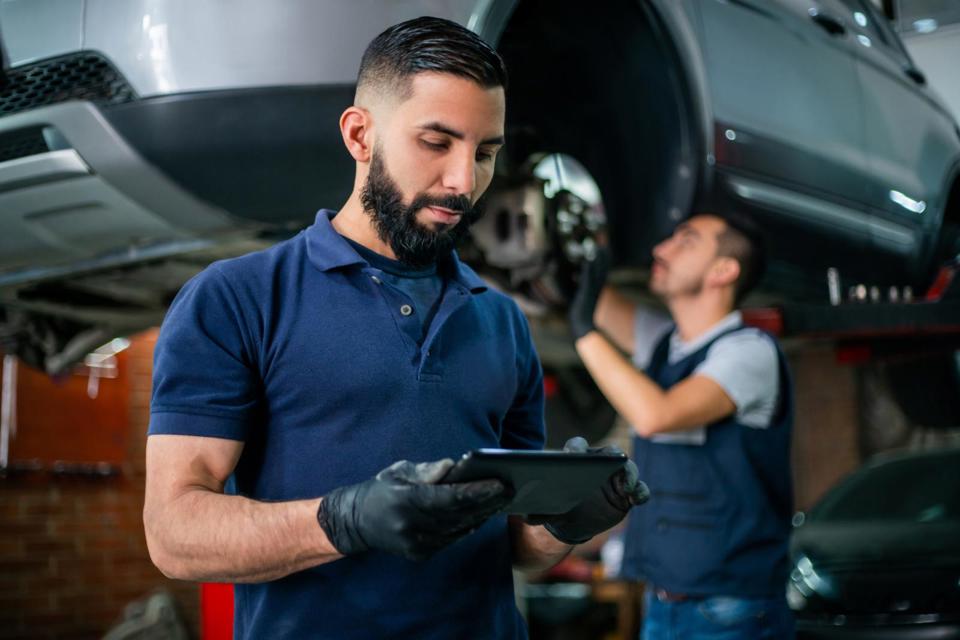In a list of top 20 manufacturers, Tesla has the lowest servicing costs, according to analysis conducted by Cap HPI.
The electric vehicle (EV) manufacturer is also the cheapest for brakes, but comes last for tyre costs, ranked as the most expensive of all the current top 20 car brands.
Overall, it means that the brand is ranked 16th for total service and maintenance (SMR) costs.
Over three years and 60,000 miles, Tesla service costs £338 on average, making it the cheapest vehicle to service of the top 20 manufacturers, costing £143 less than second-ranked manufacturer Skoda, £195 less than a Renault service and £217 less than Honda.
Hyundai is the most expensive of the leading 20 OEMs for servicing at £1,122 on average, over three times the cost of a Tesla service.
Ranking first for tyres at £801 is Peugeot, almost three times cheaper than Tesla, which ranks 20th for tyre costs at £2,377.
However, Tesla also ranks first for brakes with an average cost of £113 compared to Land Rover, ranking 20th with a cost of £916.
Overall, the manufacturer ranking first for total SMR costs, including service, tyres, brakes, and all other costs, is Renault at £1,883, followed by Honda (£1,902), Seat (£1,933), MG Motor UK (£1,999) and Peugeot (£2,039). Tesla ranks 16th overall with a total SMR cost of £2,946. BMW ranks 20th with an average total SMR cost of £3,944.
Andrew Turner, senior product specialist at Cap HPI consulting, said: “Although Tesla ranks first for straight service costs, once you factor in all the other elements such as tyres, this brings up the overall SMR costs significantly, making it one of the more expensive vehicles just ahead of Audi, Mercedes-Benz, Land Rover and BMW. It’s basically tops for servicing and brakes but very heavy on tyre costs.
“Outside of servicing, tyres are the main cost consideration for EV drivers, with tyres typically more expensive as they become worn sooner than ICE equivalents, mainly due to vehicle weight.
“In addition, EVs, on average, have larger or less common tyre sizes that are more expensive. There are numerous factors to consider in all of this, but fundamentally, when it comes to basic service costs, EV models do cost less to run.”
|
|
36/60 SMR - Top 20 Brands |
||||
|
|
Total |
Service |
Tyres |
Brakes |
Others |
|
Renault |
1,883 |
533 |
962 |
240 |
148 |
|
Honda |
1,902 |
555 |
975 |
271 |
101 |
|
SEAT |
1,933 |
586 |
826 |
326 |
195 |
|
MG Motor UK |
1,999 |
699 |
999 |
171 |
129 |
|
Peugeot |
2,039 |
758 |
801 |
327 |
153 |
|
Vauxhall |
2,215 |
807 |
861 |
359 |
189 |
|
Kia |
2,226 |
806 |
1,012 |
252 |
156 |
|
Skoda |
2,315 |
481 |
1,439 |
225 |
170 |
|
MINI |
2,354 |
749 |
1,193 |
262 |
151 |
|
Nissan |
2,359 |
750 |
1,154 |
293 |
162 |
|
Volkswagen |
2,435 |
653 |
1,227 |
355 |
200 |
|
Toyota |
2,499 |
1,008 |
1,026 |
291 |
175 |
|
Ford |
2,516 |
838 |
1,052 |
448 |
178 |
|
Hyundai |
2,716 |
1,122 |
1,098 |
285 |
210 |
|
Volvo |
2,859 |
633 |
1,740 |
350 |
136 |
|
Tesla |
2,946 |
338 |
2,377 |
113 |
118 |
|
Audi |
3,553 |
1,099 |
1,555 |
670 |
229 |
|
Mercedes |
3,644 |
1,012 |
1,850 |
639 |
143 |
|
Land Rover |
3,770 |
855 |
1,882 |
916 |
117 |
|
BMW |
3,944 |
1,117 |
1,881 |
760 |
186 |
Fleets warned of SMR challenges
Cap HPI’s analysis comes as fleet management provider i247 Group warned fleets that SMR is becoming increasingly complex as new manufacturers enter the UK market.
It says that fleets face SMR challenges caused by some of these new manufacturer entrants, who have yet to develop their fleet aftersales processes.
With often limited aftersales garage networks able to accommodate fleet maintenance requirements, it explained that this can lead to challenges handling maintenance and warranty work, causing significant complexity for fleets and the end user.
The insufficient infrastructure, it claims, is further complicated by the fact that some new carmakers, and the aftersales maintenance solutions they have in place, are not always accessible on fleet industry authorisation platforms.
These platforms, such as 1link, are critical for coordinating SMR activity for maintained vehicles.
The knock-on effect for fleets is that, without the ability to authorise maintenance and payments, processes become manual and therefore slower, with i247 Group reporting these problems are leading to SMR delays and increased fleet vehicle off road time across EV models.
Other newcomers to the fleet space bring their own challenges, specifically around SMR bookings, where fleets must utilise the manufacturer app to schedule appointments as opposed to calling fleet maintenance helplines.
The result means some fleet users receive a very different maintenance experience, depending on the brand of vehicle they drive.
The company says it is vital that the current SMR infrastructure problems are considered by new manufacturers to avoid further impacts to fleets.
Steve Thornton, commercial director at i247 Group, said: “We want to make fleets aware of the range of SMR issues we are seeing.
“Businesses who are adding new vehicle brands to their fleet need to be aware that the SMR aspect is growing in complexity.
“The lack of fleet readiness from some new manufacturers means there is more potential for vehicle off road time, so it is critical that companies consider these challenges pro-actively.”





















Login to comment
Comments
No comments have been made yet.